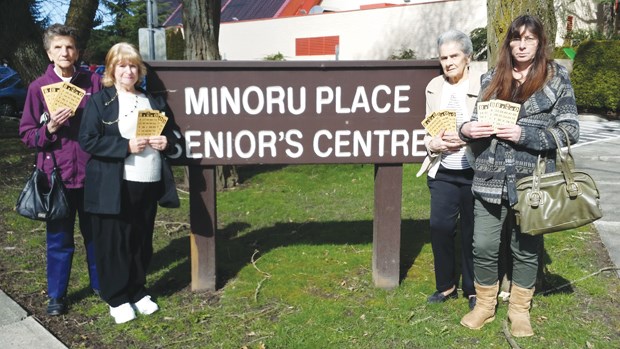It’s a case of B-I-N-G-NO!
About 50 seniors who take part in the bingo program at Minoru Place Seniors’ Centre are upset over the sudden cancellation of their twice weekly activity.
The program, that sees seniors bet $5-10 each session had been running without a gaming licence for years. According the BC Gaming Policy and Enforcement Branch it was a member of the public that tipped it off to the nefarious activity.
The seniors typically gathered on two weekdays to eat a meal and bet loonies and twoonies, usually for only a total of $2-10 per session, depending on how brave a player is.
One of the other problems cited by players is the abrupt end of the games and a lack of consultation.
“The problem I have is that no one consulted with us on what was happening,” explained Georgina Hamilton, a past president of the Minoru Seniors Society, and an avid bingo player.
According to a memorandum from Renata Turick, a seniors’ centre coordinator, the Bingo Committee had conducted a study of the bingo program and found an 83 per cent drop in participation over the last five years.
According to the study, the bingo program had gone from generating revenue to losing money.
Management at the centre had also neglected to apply for a gaming licence with the BC Gaming Commission. That licence would have cost $10 per year.
No one from management, including the centre’s head coordinator Eva Busich-Veloso, would speak directly to the Newswhen contacted, and inquiries were directed to city spokesperson Ted Townsend.
Townsend said the program was being “heavily” subsidized but couldn’t provide numbers.
“It doesn’t justify the time and space being devoted to the program, given all the other demands at the centre,” said Townsend.
Hamilton also said some of the issues were understandable but questioned why bingo couldn’t be moved to a smaller room or to a different day and time.
She also questioned the study’s veracity, noting an 83 per cent drop would have meant there was once hundreds of bingo players, which was not the case.
In the memo to bingo players, Turick noted the program would be terminated in August after a vote from the board of directors.
What happened instead was a sudden cancellation last week because, according to Townsend, the gaming commission approached the city about the program.
Hamilton said she suspects the city could have notified the commission itself to expedite the closure. In any case, the centre was negligent for not having a licence to begin with, she said.
Townsend said, when the program started years ago, no licence was required.
A Ministry of Finance sokesperson, who oversees the enforcement branch said in an email that a "member of the public" forwarded to the branch the memo after it was posted in the centre's lobby.
Valerie Taylor, whose 83 year-old mother plays bingo, said the centre’s alternative to shuttle players to more expensive bingo halls is short-sighted.
“You would think with the amount of money being spent on the new and larger centre, they would be thinking about expanding programs, not eliminating them,” said Taylor.
Taylor also questioned the timing of the closure, noting it was terminated immediately after some of the players had begun a petition.
“I see that the (centre) seems to be running much like a dictatorship,” added Taylor.



